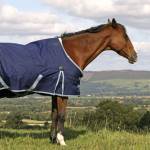Senior Horse Care: Chums, Chores, Chow, and a Checkup

Do you have an older horse that’s no longer fast enough to win the barrel racing event, not sound enough for jumping, or too arthritic to carry you on long trail rides? The senior equine might not be as useful as he once was, but he still needs some basic management to keep him happy and healthy.
Chums. As herd animals, horses don’t like to be isolated from others of their kind. If your older horse can be turned out with other equines, that’s the best way to keep him from getting lonely, bored, and depressed. Older horses sometimes decrease in social status, putting them at risk for being chased or bullied by more dominant animals. If another horse pushes the oldster away from hay or water sources, you might have to move the senior equine to an adjoining paddock, preferably with a congenial buddy or two. If you don’t have a suitable companion, consider getting a pony, goat, or sheep as a pasture pal for your older horse. Also, check with friends or members of a horse club to see if someone else has a lonely senior equine. Putting these two together may be the best answer for all involved. TIP: Change is hard when older horses have been used to a certain routine. If you introduce a new horse as a companion, let the two share some time in side-by side stalls or secure paddocks before turning them out together. Monitor the new friends for several days to see whether the match is a happy one for both animals.
Chores. If your horse has always been in an exercise program and is suddenly retired because of age or injury, he may actually miss the routine of training and competition. If this is the case, you might see weight loss and signs of depression when he has no regular job to do. Keeping older horses active, even at a very undemanding level, is the cure for this problem. You may not have time to provide some sort of work every day. If this is the case, consider leasing the horse to another rider who can fit in a schedule of light work; or contact the leader of a 4-H or other youth organization to find a teenager who would love to groom and hand-walk the horse several times a week (check liability and safety with this arrangement); or think about letting a hippotherapy program use the horse as a mount for its activities. TIP: If the horse seems uncomfortable while standing or moving, and particularly if he begins to resist being saddled or ridden, he may be showing chronic pain from arthritis, a sore back, or another problem. Have a veterinarian check the horse to find and treat discomfort.
Chow. When a horse’s exercise routine changes, his feeding program may need to be revised as well. Good-quality forage should be the basis for all equine diets, and the less active horse still needs to be given 1.5 to 2% of his body weight in grass or hay each day. If he has been getting large concentrate meals to fuel training and performance, these feedings should be slowly reduced and possibly cut out completely if the horse can maintain his condition on forage alone. A vitamin/mineral supplement can be used to provide important nutrients. TIP: Make all changes to a feeding program gradually over a period of week to ten days. If the horse gains or loses a significant amount or weight, or if he isn’t eating well, check with a veterinarian or an equine nutritionist. You may need to have an equine dentist do some corrective work to restore easy chewing.
Checkup. As your horse moves through his less active years, watch for behavior that may be related to physical changes or health status. Schedule routine checkups with a veterinarian, and ask this professional to evaluate the horse’s sight and hearing as well as his overall health. Mention any out-of-character behaviors such as aggression toward other horses, problems with gaits or balance, or an odd way of standing. The veterinarian will probably ask about the horse’s eating habits, energy level, manure production, and overall attitude. He may be able to find and treat any problems in an early stage, keeping the horse comfortable and able to enjoy his retirement.








